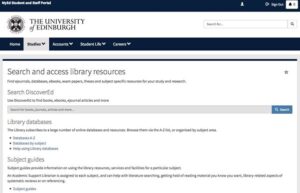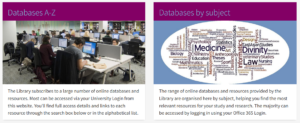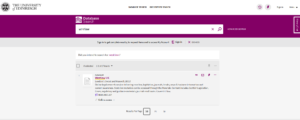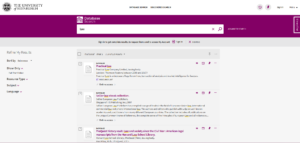If you’re an academic working in the School of Law, you may have seen several emails flying back and forth about Resource Lists and getting them created for new courses, or updating those for courses due to run in the next academic year. You may be curious about what all the fuss is about and whether they even actually help our students find the things they need. If you’re a Course Organiser we’d love to encourage you to set up a list, if you haven’t already, and make it as helpful as possible for the incoming cohort. We’re keen to bust some myths which might be putting people off so let’s look at some common concerns below.
I’m too busy, I really don’t have time to make up a list or learn how Leganto works!
We appreciate the huge time pressure that our academic colleagues face, but it doesn’t mean you need to duplicate work or construct a list from scratch. Here are some ways we can help:
- If the Course Organiser already has their reading list in a word document and can indicate priority on this (Essential/Recommended/Further Reading) then this can be sent to the Library via the online form and they will create the list.
- If the materials which make up the reading list are contained in the Course Guide, or one or more other documents, handouts or presentations, we Law Librarians will be happy to help collate these into a Resource List and work with COs to finalise the list.
- If the Course Organiser has the time and wishes to, they can create the list themselves. Full guidance is available on the library website.
I’ve missed the deadline, is there any point in still submitting a list?
Yes absolutely. The deadlines the Library sets for submission or review of Resource Lists is deliberately early so that they can guarantee to have lists and purchases ready for the start of teaching. However, missing the deadline should not be a reason not to create or review a list at all. Lists can be submitted at any time and the Library will do their best to get them ready as quickly as they possibly can. Lists submitted after the deadline will be dealt with first come, first served so there is a benefit to getting them in as early as possible! Where possible, Course Organisers are strongly encouraged to send their lists to the Library by the stated deadlines.
But I don’t know everything I’ll need right now. Some of my guest tutors may have things to add later.
Lists are not set in stone once submitted to the library. Course Organisers can add to and amend the list at any time, even during teaching if necessary, but getting the bulk of your list organised now means it’s more likely to be ready before your students need it.
I am concerned that this is ‘spoonfeeding’ our students. If they get links to every resource they need, they won’t investigate on their own.
There is no expectation that every possible resource related to the course topic will be included in the list. The Essential readings must be included, but the Course Organiser can choose to include Recommended and Further Readings as appropriate (with the caveat, of course, that items not included on lists can’t be taken into account in the Library’s planning for purchases and digital subscriptions, so they wouldn’t be able to guarantee availability).
Resource Lists foster student library skills, by keeping them within the Library ecosystem of tools and services rather than in Google Scholar or ChatGPT. Furthermore, the Library offers their LibSmart online course to help build these skills.
Use of a Resource List does not de-skill our students, or hinder the development of research skills. If one of the key tasks on a course is for students to research and discover materials by themselves, then of course those materials need not be included on the course Resource List. The key accessibility need is to remove barriers to students finding and engaging with their essential readings – the ones they cannot do without – and allowing them to plan their time accordingly (they are also under, at times, extreme pressure). Student feedback on Resource Lists demonstrates how much the system helps with this and how valuable our students find it.
I’ve never had a Resource List before and I don’t want one now. My methods of teaching have always been fine in the past!
Providing a Resource List does not force a Course Organiser to change the way they teach. It simply provides the students with their readings and other resources in the same place and in a consistent way across all their courses, whichever School they might be in. In fact, use of the Resource List system frees up staff time, as they no longer need to provide and maintain their own lists of references and links – they can simply refer the students to the Resource List atthe appropriate places and have the Library review the list each year to keep it current.
Hmm, I’ll think about it, but I do have more questions.
Great, no problem. We have actually created a guidance document specifically for the School of Law which goes into more depth on what you may or may not wish to include on your list: Law Resource List guidance v3
You could have a look at that first, and if you still have questions just let us know. We’re happy to discuss resource lists via email at any time. You can also contact the Library Learning Services team (who run the Resource List service) directly for assistance with creating and editing lists.
We hope this has been convincing. We love Resource Lists here at the library because they help us keep our fingers on the pulse of what’s being used to teach. It helps us keep the Law Library stocked with the right texts for the right student numbers, which is of crucial importance to supporting our users in their study and research.
Watch this space for more on Resource Lists as we launch into the new academic year, where we’ll be posting up recommended user guides for students as well as stats on the top used Resource Lists for the school.
This post was created using material written by Neil Davidson, Learning Technologist for the School of Law. Neil is an expert in the creation and use of Resource Lists and can be contacted via email.














